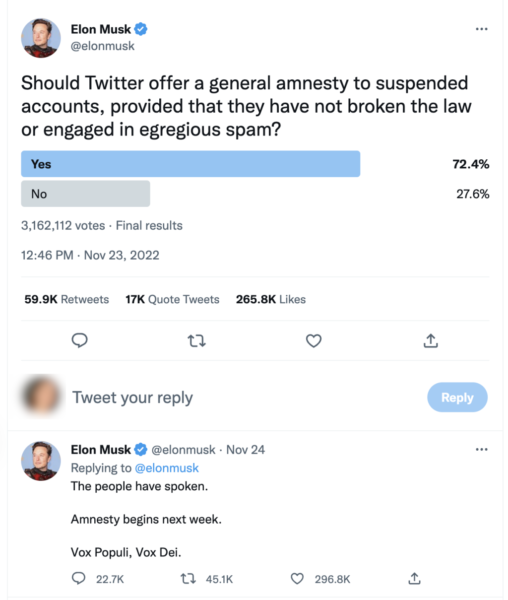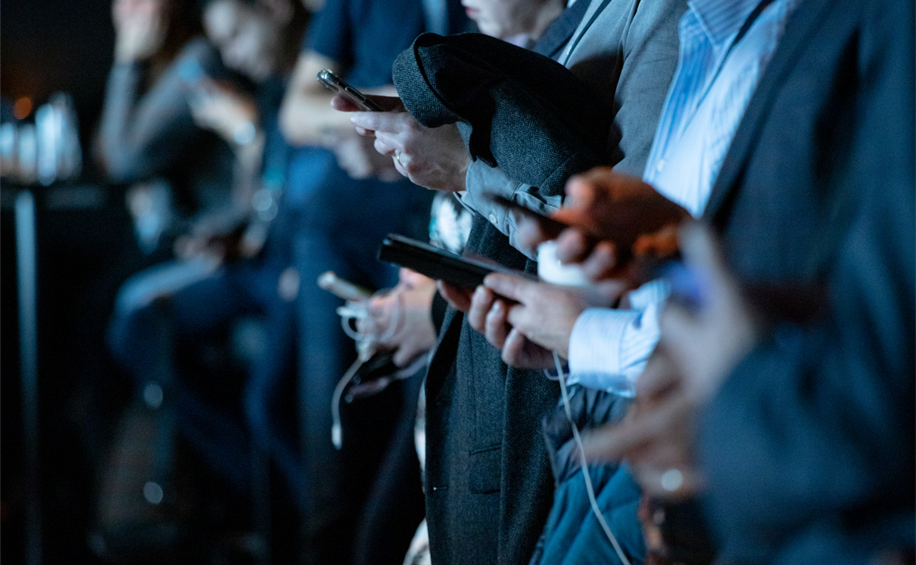Online content regulation may be necessary to safeguard democracy and the quality of information people consume amid harmful falsehoods and outright violence.
Elon Musk’s October 27 acquisition of Twitter, which entailed massive layoffs for key staff, led to a precipitous drop in content moderation. This lapse paired with Musk’s increasingly rightward lean and an “anti-democratic worldview” has allowed hate speech and misinformation to fester on the platform.
This is an old issue: social media sites have long failed to ensure the fair and truthful spread of information. Documents released last year showed how “Facebook routinely makes exceptions for powerful actors when enforcing content policy,” even as it cut traffic to progressive news sites.
But now, the Twitter Blue subscription service that replaced the platform’s previous account verification process allows users to pay $8 per month for a blue check mark and boosted posts. This provided opportunities for previously banned QAnon accounts to return to the platform and continue to push conspiracy theories.
QAnon is one of many disinformation channels that contributed to advertisers flocking from Twitter. Musk himself has also amplified conspiracy theories and personally reinstated almost a dozen high-profile right-wing users, including former President and prolific liar Donald Trump.

Musk performed an unscientific poll on Twitter that he used to decide to offer “general amnesty” to suspended accounts. Media Matters noted the reinstated profiles included additional members of the violent QAnon conspiracy theory, accounts that spread COVID-19 misinformation, promoters of right-wing culture wars, proponents of anti-LGBTQ rhetoric, and election deniers.
Examples abound of the platform flooding with antisemitism, racism, and islamophobia. The Network Contagion Research institute found that slurs targeting Black people rose 5,000% following Musk’s acquisition, while researchers at Mont Clair State University found a clear rise in hate speech at the same time.
Evidence suggests that bad actors are trying to test the limits on @Twitter. Several posts on 4chan encourage users to amplify derogatory slurs.
For example, over the last 12 hours, the use of the n-word has increased nearly 500% from the previous average. pic.twitter.com/mEqziaWuMF
— Network Contagion Research Institute (@ncri_io) October 28, 2022
The Global Network on Extremism and Technology has raised concerns that Twitter “will not only become a haven for racist trolls but similarly a den of inequity rife with extremists.” According to Institute for Strategic Dialogue research teams, an “emboldened set of extremists” have been able to establish small footholds: by the first 12 days of Musk’s takeover, the organization tracked 450 new Islamic State Twitter accounts.
In response to the use of digital platforms “as vectors for disinformation, hate speech, conspiracy theories and other content potentially harmful to democracy and human rights,” The United Nations Educational, Scientific and Cultural Organization (UNESCO) is hosting a global conference February 21-23 to shape regulation on digital platforms.
UNESCO Director-General Audrey Azoulay said of the conference:
“The aim is to collectively define the principles and means of content moderation, while respecting human rights and, in particular, freedom of expression. This is the challenge facing regulators around the world and, to support them in this task, UNESCO has launched a series of consultations with Member States, representatives of the technology sector and the agencies of the United Nations system.”
Several studies that UNESCO cited pointed to vast misinformation circulating on Facebook and other platforms: during the European elections of 2019, 500 Facebook pages and groups that promoted disinformation received 533 million views with likes, comments, or shares by 67 million people.
UNESCO aims to develop a regulatory framework to “protect users from content that damages democracy and human rights.” United Nations Secretary-General António Guterres said large-scale disinformation that undermines science presents an existential threat to humanity.
“While vigorously defending the right to freedom of expression everywhere,” said Guterres, “we must equally encourage societies to develop a common, empirically backed consensus on the public good of facts, science and knowledge.”
Photo by camilo jimenez on Unsplash.

